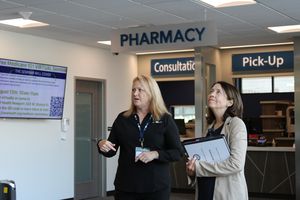A health nonprofit based in northeastern Washington has received a significant funding boost aimed at expanding job opportunities and healthcare access in a rural area. As part of the resolution to reopen the federal government, Congress allocated $2 million to NEW Health’s Chewelah branch. This funding will facilitate the creation of both clinical and nonclinical positions within the organization, according to CEO Desiree Sweeney.
The newly secured funds will enhance workforce development initiatives and improve access to dental and health services for residents in northeastern Washington. Sweeney highlighted the organization’s extensive coverage area, stating, “We cover about 5,600 square miles in Ferry, Stevens, and Pend Oreille counties, as well as having a mobile unit that deploys out to schools for physicals, dental access days, career fairs, and health fairs.” She emphasized that the impact of this project would extend well beyond Chewelah, benefiting the entire eastern region of the state.
The need for such initiatives has become increasingly urgent following the recent closures of essential healthcare services in the area. Earlier this year, orthopedic services and the DominiCare program, which provides companion-based support for elderly individuals requiring nonclinical home services, were discontinued at Providence St. Joseph’s Hospital. The hospital cited several financial pressures contributing to these closures, including cuts to Medicaid and Medicare, rising operational costs, and payment denials from insurers.
In a statement, Providence acknowledged the challenges posed by these financial headwinds, particularly concerning cuts to vital safety-net programs outlined in the recently passed HR1, also referred to as the One Beautiful Bill Act. “These headwinds will only intensify when the cuts to vital safety-net programs that were included in the recently passed HR1 go into effect,” the release stated.
Amid these challenges, Sweeney reaffirmed NEW Health’s commitment to adapting to the evolving healthcare landscape. “When we see a lot of changes in the healthcare landscape, especially around critical access hospitals, NEW Health is leaning into our communities. We’re community invested,” she remarked. This approach underscores the organization’s dedication to addressing the healthcare needs of the population it serves, despite the pressures facing the local healthcare system.
As NEW Health prepares to implement these changes, the focus will remain on enhancing the quality and accessibility of healthcare services in a region that has historically faced significant barriers to such resources. The funding will not only create jobs but also play a crucial role in ensuring that future generations have improved access to essential health services.
